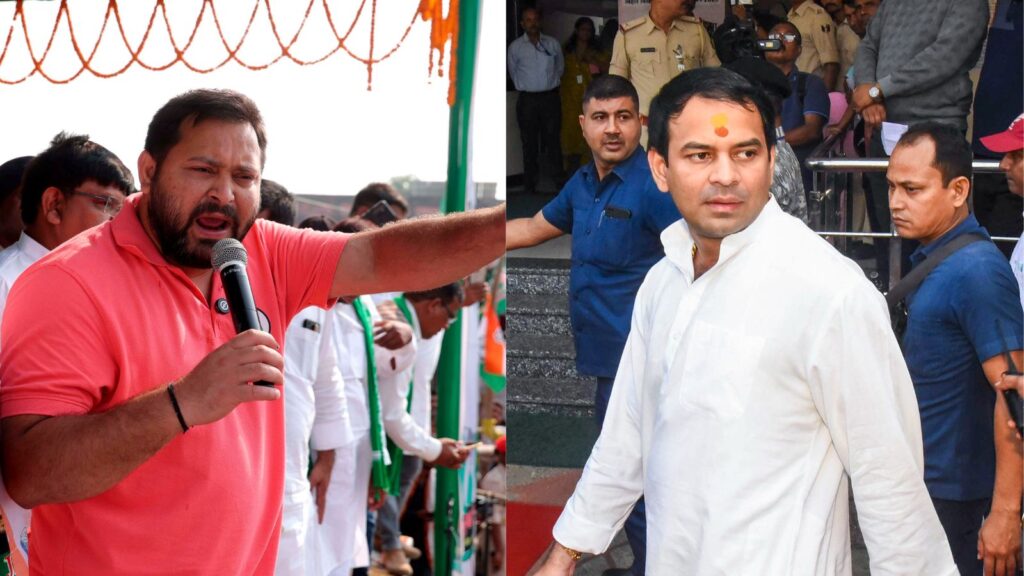On October 16, clutching a framed photograph of his late grandmother Marachhiya Devi, Tej Pratap Yadav reached the Sub-Divisional Office in Mahua, to file his nomination for the Bihar election from the constituency, returning to the seat where his political career began in 2015. However, unlike his past nominations, when he was accompanied by his family members, Tej Pratap arrived alone this time.
“My grandmother is supreme. With her blessings, we will win not just in Mahua but all the seats the Janshakti Janata Dal (JJD) is contesting,” he told reporters, adding that “Mahua is my family.”
A day earlier, his younger brother Tejashwi Yadav had filed his nomination from Raghopur in the presence of both their parents – RJD founder Lalu Prasad and ex-chief minister Rabri Devi – along with sister and MP Misa Bharti.
Once key faces of the RJD first family, the differences between the estranged brothers could not have been sharper as they find themselves now on the opposite sides of Bihar’s political divide. For the first time, the two siblings are not contesting the elections together, their contrasting campaigns revealing not just a personal conflict but separate struggles.
For Tejashwi, the RJD and Mahagathbandhan’s CM face, the Bihar election is an opportunity to oust the incumbent Nitish Kumar-led NDA government and take the helm of the state. For Tej Pratap, it is a solitary battle for political survival.
Expelled from the Lalu family and the RJD in May this year following a social media post indicating a “long relationship” with a woman, Tej Pratap initially went on to form a coalition of five smaller parties under “Team Tej Pratap”. Subsequently, he declared himself the JJD president and fielded candidates in 43 of the state’s 243 seats, mostly in Yadav-dominated seats or the RJD’s strongholds.
In seats like Mohiuddinnagar, Bakhtiyarpur and Sonpur, former local RJD leaders and ex-MLAs were nominated by the JJD, once they were denied the RJD tickets.
Spearheading the RJD’s campaign, Tejashwi also reached Mahua in support of party candidate and sitting MLA Mukesh Roshan. Without naming his brother, he urged voters to support the RJD’s lantern symbol, calling for loyalty to the party, not family. “The party is everything. If the party remains, everything remains,” he said.
Tej Pratap hit back, both on social media and in his public meetings, maintaining that “Our respected public is bigger than any party. In democracy, the public alone is supreme, not any party or family. Mahua is my political karmabhoomi – it is above party and family.”
In his rallies, he cast himself as the “wronged elder brother” standing for the common voter against the institutional RJD led by Tejashwi. He also went to the Raghopur constituency to campaign for his nominee Prem Kumar Yadav.
In a bid to stake his claim on Lalu’s political legacy, he even told a meeting in Bidupur-Chaksikandar: “The RJD with green flag is fake, the real Lalu ji’s party is ours (JJD).”
The contrast between the two brothers’ campaigns is as stark as the difference between their political hefts. Tejashwi’s campaign is a well-orchestrated affair mounted on a large-scale across the state. As the Mahagathbandhan leader, he traverses Bihar in helicopters, addressing as many as ten to fifteen rallies daily, often alongside senior leaders from the Congress, CPI(ML)L, and VIP.
His well-structured messaging, focused on unemployment, governance, and Nitish’s alleged failures, is reinforced by a vast organisational network.
Tej Pratap’s meetings are smaller and more personal. He often addresses two to three rallies a day. His speeches mix populist appeals with spiritual references and personal anecdotes, punctuated with lines about “clean politics” and “true service”.
His personal appeal deviates from Tejashwi’s manifesto-driven promises of jobs, sops and welfare schemes.
The machinery gaps between the two campaigns also remains immense. Tejashwi relies on a state-wide party structure. Local Mahagathbandhan leaders arrange his campaign logistics, while their booth-level workers handle mobilisation on the ground.
He commands the organised vote of the RJD supporters, of the Muslim-Yadav combine, and of the Opposition alliance’s bases. His message is for ushering in a “change in Bihar” if the alliance forms government.
On the other hand, Tej Pratap’s fledgling party is essentially a start-up outfit, whose volunteers double up as his coordinators. His local events depend on personal networks and even last-minute arrangements.
Tej Pratap’s hopes in Mahua and other seats lie in emotional appeal. A section of the Yadav community is believed to view his expulsion as “harsh”, expressing sympathy for him. Rabri Devi, in a recent interview, also struck a conciliatory tone, saying, “Tej Pratap has left the party but not our hearts.”
The brothers’ rivalry has cast a shadow over the Bihar polls. In multiple constituencies with sizeable Yadav voters, the JJD candidates are in the fray. If even a small section of Yadavs shifts to Tej Pratap, its ramifications could be significant, benefitting the NDA and damaging the RJD, especially in closely-fought seats.

